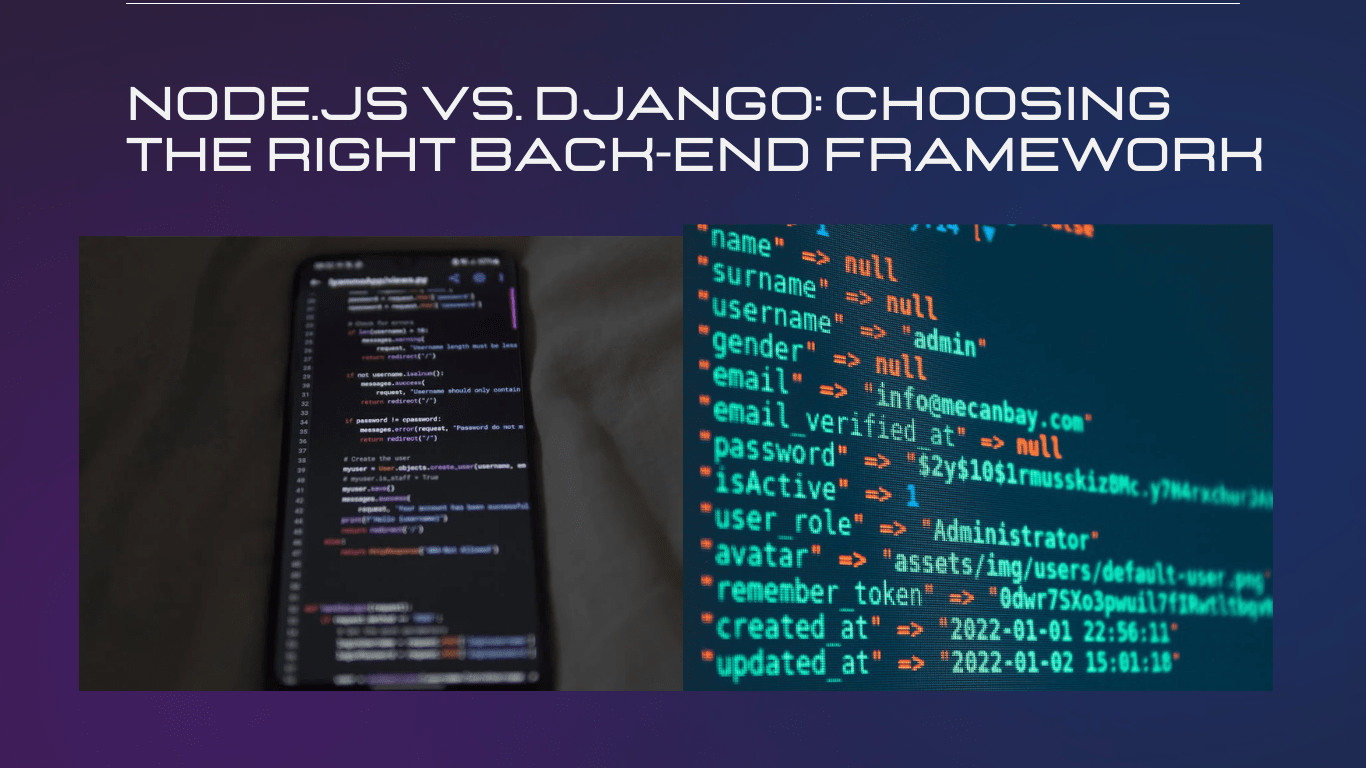Node.js vs. Django: Choosing the Right Back-End Framework

Node.js vs. Django: Choosing the Right Back-End Framework
Choosing the right back-end framework is crucial for the success of a web application. Both Node.js and Django are powerful options, but they cater to different needs and development styles. This guide compares Node.js and Django to help you make an informed decision based on your project’s requirements.
Overview of Node.js and Django
- Node.js:
- A JavaScript runtime built on Chrome’s V8 engine.
- Enables developers to use JavaScript for both client-side and server-side development.
- Often paired with frameworks like Express.js for building web applications.
- Django:
- A high-level Python framework designed for rapid development and clean, pragmatic design.
- Includes tools for database management, authentication, and more, following the “batteries-included” philosophy.
Core Differences
| Feature | Node.js | Django |
|---|---|---|
| Language | JavaScript | Python |
| Architecture | Event-driven, non-blocking I/O | MVC (Model-View-Controller) |
| Learning Curve | Moderate (familiarity with JS required) | Easy for Python developers |
| Performance | Excellent for real-time applications | Optimized for CRUD and database-heavy apps |
| Built-in Features | Minimal; relies on third-party modules | Comprehensive (auth, ORM, admin panel) |
| Scalability | High scalability with event-driven model | Suitable for vertical scaling |
Key Features Comparison
1. Performance
- Node.js:
- Its non-blocking, asynchronous architecture excels in handling high-concurrency tasks.
- Ideal for real-time apps like chat applications, live notifications, or streaming platforms.
- Django:
- Synchronous and optimized for database-driven operations.
- Great for applications where data consistency and processing are critical, like CMS or e-commerce.
2. Development Speed
- Node.js:
- Requires assembling multiple modules and libraries, giving developers flexibility but increasing setup time.
- Freedom of choice can lead to inconsistent codebases in large teams.
- Django:
- Comes with built-in features like an ORM, admin panel, and authentication, reducing the need for external packages.
- Promotes consistency and rapid prototyping.
3. Scalability
- Node.js:
- Horizontal scalability is a strength, with the ability to handle numerous concurrent connections.
- Ideal for microservices and distributed systems.
- Django:
- More suited for vertical scaling, relying on optimized database queries and server upgrades.
- Can handle scaling needs with proper optimization and load balancing.
4. Community and Ecosystem
- Node.js:
- A massive community with a vast array of libraries and tools available via npm.
- Strong support for full-stack development when paired with frontend frameworks like React, Angular, or Vue.
- Django:
- A mature community with extensive documentation and packages available via PyPI.
- Works well with Python’s ecosystem, including AI/ML libraries like TensorFlow and NumPy.
5. Security
- Node.js:
- Relies heavily on third-party libraries, which may introduce vulnerabilities if not carefully managed.
- Developers need to implement security measures, such as rate limiting and input sanitization.
- Django:
- Offers built-in security features, including protection against SQL injection, XSS, and CSRF attacks.
- Ensures a secure development process by default.
When to Choose Node.js
Pros:
- Real-Time Applications: Perfect for apps requiring real-time communication, such as chat apps or live dashboards.
- Flexibility: Provides full control over the tech stack.
- Unified Language: JavaScript for both frontend and backend simplifies development.
- Microservices: Excellent for building scalable, microservices-based architectures.
Cons:
- Setup Complexity: Requires piecing together libraries and tools for common functionality.
- Security Concerns: Heavy reliance on third-party modules can lead to vulnerabilities.
Use Cases:
- Real-time applications (e.g., chat apps, collaborative tools).
- Streaming platforms.
- RESTful APIs and microservices.
When to Choose Django
Pros:
- Rapid Development: Built-in tools like the admin panel and ORM speed up development.
- Security: Comprehensive built-in protections make it a great choice for secure applications.
- Ease of Use: Designed to be beginner-friendly, especially for Python developers.
- Consistency: Enforces a structured development pattern (MVC).
Cons:
- Performance Limitations: Synchronous nature may not suit high-concurrency real-time apps.
- Scalability: Horizontal scaling is less straightforward compared to Node.js.
Use Cases:
- Content Management Systems (CMS).
- E-commerce platforms.
- Data-driven apps with complex queries.
- Enterprise-grade applications with robust security needs.
Conclusion
The choice between Node.js and Django depends on the specific requirements of your project:
- Choose Node.js if you need a high-performance, real-time application or a scalable microservices architecture.
- Choose Django if you’re building a secure, database-driven application with a focus on rapid development and consistency.
Consider factors like team expertise, project timeline, and application complexity to make the best decision. Both frameworks are powerful, and the right choice can set the foundation for a successful project.